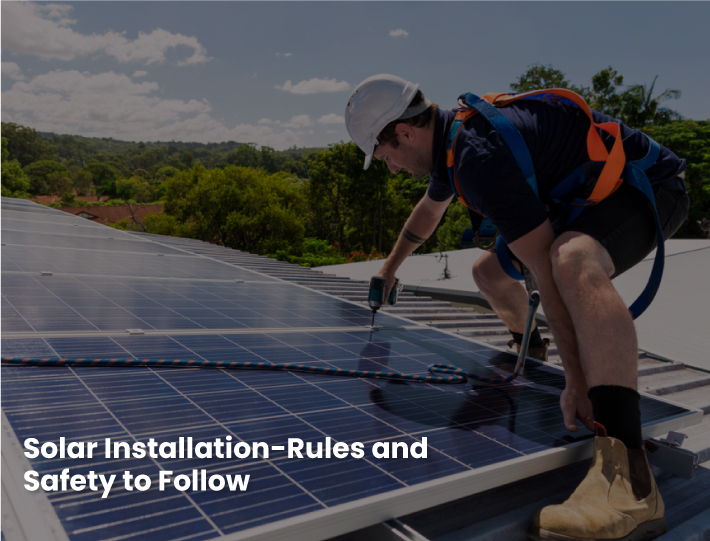Solar Installation: Rules and Safety to Follow
It takes a lot of time and effort to install a system with the best Solar panel installation company, and it must be done correctly to avoid any issues. There are a number of safety concerns to bear in mind while installing a solar system as well, just as with any other electrical system. In the event of noncompliance with all safety regulations, the individuals working on the installation may suffer significant injury or death. In the long run, a system that is set up incorrectly might lead to issues that could make the region dangerous.
Worker protections in the solar industry:
â— When the Weather is Severe, always Stop Working
You should always cease working in adverse weather as a first safety precaution. If you're working with solar panels or other PV parts, When dealing with electricity, you might get electrocuted. The PV system might be damaged if the panels are blown around by the wind during a storm. Due to the risk of sliding or falling in snow or high winds, you should never work alone in these conditions, and you should always have at least one other person with you in the event of an accident or emergency.
â— Solar Panels Must be Lifted and Moved by Hand
Lift each solar panel with at least two individuals using safe lifting practises. Using a forklift to transport solar panels is recommended if at all possible. In order to avoid a possible injury or electrical shock from solar panels, do not sit on or stand on them. Do not drop anything on the solar panels, since this might cause them to be damaged or broken. Remove any obstructions or
anything up or down during the installation of a PV panel.
â— Using Solar Panels as a Tool
debris from beneath your solar panels by cleaning the region. Make sure to keep an eye out for falling objects and never toss
When solar panels are unpacked, they should be covered with an opaque sheet to avoid heat or energy accumulation. When connecting photovoltaic solar panels, be sure to cover them with an opaque substance to halt or prohibit production of power.
Work with solar panels while wearing insulated gloves, as they may carry an electric charge. To avoid causing your roof to leak after installing solar panels, be careful not to get the home's sheathing wet. A common problem with new roofs is that they might leak if the shingles are missing or have been removed at some time.
â— Assisting with Roofing
Don't ever use a winch system, a crane, or any other type of hoist to lift solar panels onto a roof without first doing a thorough inspection on each one. It is important to check the roof's strength before installing solar panels, as solar panels may be rather hefty. To avoid injury or death while working on roofs, always use the highest level of safety equipment (such as harnesses, lifelines, and safety nets). Before you begin installing your PV system, get all of your power tools examined to be sure they are safe to use. When working on a solar system, it is best to use insulated equipment with Solar panel installation Australia. Make sure the ladder isn't slipping by using rubber matting and getting a second person to hold the ladder as you climb.
â— Involvement in Electricity
A solar system installation involves dealing with electricity. Installing PV systems in compliance with local electrical/photovoltaic standards and solar energy safety regulations is therefore essential. A good rule of thumb is to check with your local ordinances and any applicable laws and statutes to see whether you need permits or restrictions for installing or inspecting solar (photovoltaic) systems.
The preceding list is only a sampling of the measures that must be followed by Solar panel installation company; it is not an all-inclusive list. It is critical to follow any additional safety precautions required by the kind, location, or technique of installation being used.

